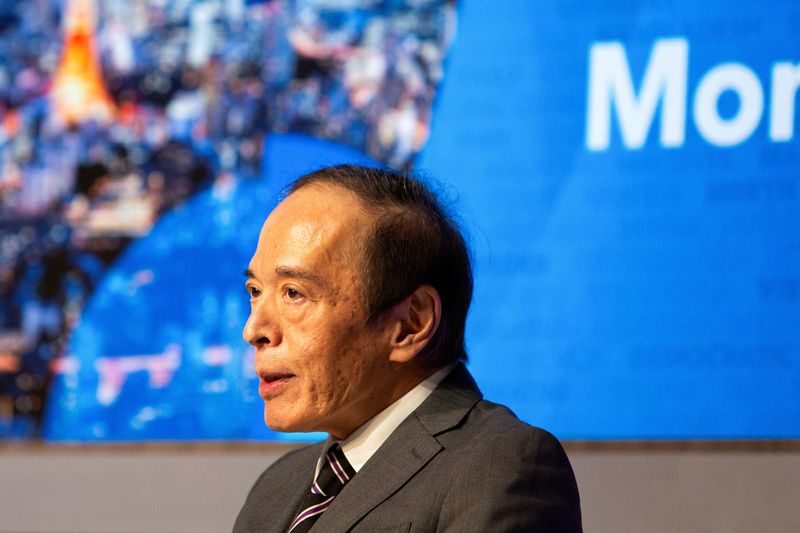By Leika Kihara
WASHINGTON (Reuters) – Aside from the mixed policy signals dropped during his trip to the International Monetary Fund and World Bank meetings in Washington, Bank of Japan Governor Kazuo Ueda offered a glimpse of how the central bank was doing some soul searching on ways to better communicate with markets.
The BOJ was blamed for amplifying a market rout in early August with its surprise interest rate hike in July, and Ueda’s comments pledging to keep pushing up rates if sustainable achievement of its 2% inflation target was foreseen.
While the direct trigger of the August sell-off was weaker-than-expected U.S. labor market data that fueled concerns the Federal Reserve should have started rate cuts earlier, the experience has led to discussions within the BOJ on ways to avoid future rate hikes from becoming a huge market surprise.
To be sure, BOJ officials had dropped signs of a chance of a July rate hike by saying the central bank would “adjust the degree of monetary accommodation” if inflation moved in line with its forecast.
But the signals did not resonate with many market players, who saw consumption as too weak to justify a hike.
For Deputy Governor Ryozo Himino, the problem was the BOJ’s ambiguous, technical language that proved hard for markets to digest.
“Communication is not about what we intend to convey, but about what actually reaches people’s mind,” he told a seminar in Tokyo earlier this month. “I remember being baffled by the ‘BOJ speak’ when I joined the bank a year and half ago.”
Reserve Bank of New Zealand Governor Adrian Orr seemed to agree, explaining how central banks “need to tell a story that people can understand.”
“They need to show empathy – seeing things through the eyes of many and speaking in plain language,” Orr said in a speech on Wednesday on the sidelines of the IMF meetings.
In the weeks ahead of July’s move, though, Ueda had no public events at which he could remind the financial press and markets of the BOJ’s basic policy strategy.
“There was a period in July where there were no communication, explicit or formal communication, between board members, and the market and media,” he said in a seminar at the IMF on Wednesday.
“Even though we may have said the same thing as we were saying in June, it could have been nice to speak a bit more in July,” he said, when asked what the BOJ could have done differently.
NO SILVER BULLET
Aside from the press briefings after the eight policy meetings held each year, the BOJ governor delivers speeches at set events roughly once every two-to-three months.
Each of the nine board members speak roughly twice a year outside of Tokyo. The schedule of these events are set well in advance with little room to shift around the dates.
There were no such events planned in July where BOJ board members could have used to communicate their views to markets.
Meanwhile, their policymaker counterparts at both the Fed and European Central Bank collectively often speak at a couple of dozen or more public events between meetings.
Fed officials spoke during at least 40 public appearances between their September meeting and the onset of the blackout period ahead of their Nov. 6-7 meeting. And in just the last week, two-thirds of the ECB’s governing council spoke publicly, some having three or more appearances.
Some BOJ board members have flagged ideas like increasing the number of media opportunities, or enhancing the BOJ’s market intelligence.
But communicating in a unified voice could prove challenging if each policymaker interprets data differently in deciding whether conditions for raising rates were falling into place.
“We can’t telegraph all our future movements ex ante,” Ueda said on Wednesday. “What we can do is to explain carefully what our economic outlook is and explain the basic monetary policy strategy.”
Not all outside observers see the BOJ as having muffed its communications.
For example Nada Choueiri, the IMF’s Japan mission chief, sees nothing wrong with the way the BOJ communicated its policy intentions.
“The BOJ has been saying that they would remain flexible and data dependent, and they explained in the monetary policy statement that the upside risks to inflation have increased,” which was a good rationale to hike rates in July, she said.
“The trigger for (the August) turmoil was really the data of the U.S. It wasn’t the BOJ policy, and certainly not their communication.”
The search for a solution will likely continue and could lead to changes in the way the BOJ delivers its messages, such as an increase in media interviews by its executives.
“There is no silver bullet in better communication. Each approach comes with pros and cons, and I would say that there is no clear consensus yet among board members about future approaches to pursue,” deputy governor Himino said.
“But I can testify that there is a strong will among us to learn from what happened, and continue to try to do better.”




























